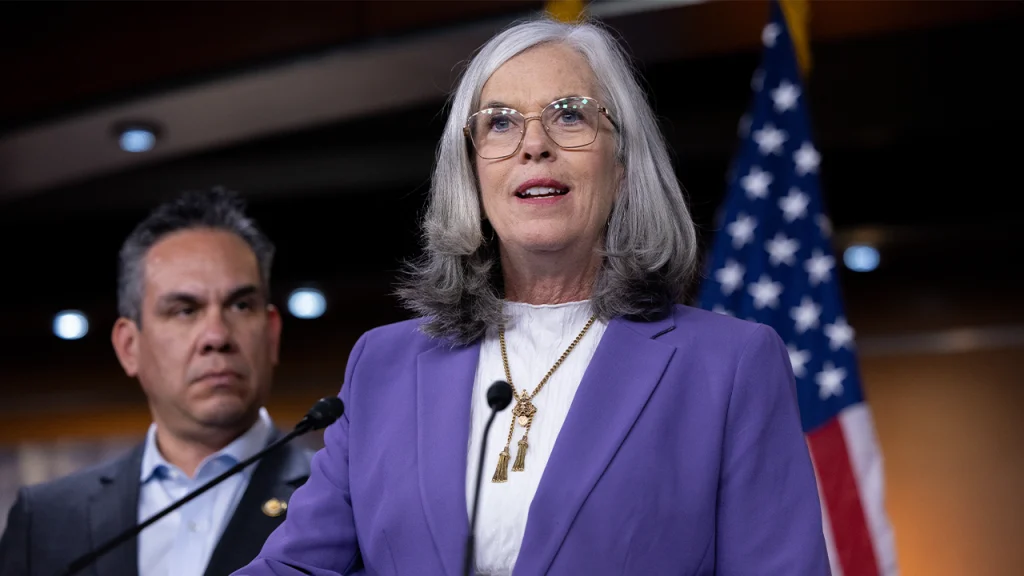Healthcare Takes Center Stage as Shutdown Drags On: Rep. Katherine Clark Frames the Democratic Position
In a revealing interview with Fox News, Democratic House Whip Katherine Clark positioned healthcare as the defining battleground for her party, even as the government shutdown stretches into its third week. “Fighting for healthcare is our defining issue,” Clark told senior congressional correspondent Chad Pergram, placing the issue at the heart of Democratic strategy. This healthcare-centered approach comes at a critical moment as the shutdown enters its 16th day with no resolution in sight, highlighting the growing divide between Democrats and Republicans on policy priorities. Clark’s emphasis on healthcare over other potential concerns—including questions about the age of Democratic candidates heading into future elections—signals a deliberate messaging strategy that connects immediate budget battles with kitchen-table concerns for American families.
The current standoff centers on the fate of pandemic-era Affordable Care Act subsidies that dramatically expanded eligibility for premium tax credits under the 2021 American Rescue Plan. These enhanced subsidies are set to expire at the end of 2025, but the timing has become politically charged with open enrollment for the ACA marketplace beginning November 1st. Democrats have drawn a line in the sand, refusing to support any government funding package that doesn’t include an extension of these subsidies. “We are watching a crisis come at us,” Clark explained, expressing concern that millions of Americans will soon receive premium notices they cannot afford. Her argument extends beyond just those directly affected, suggesting that allowing these subsidies to expire would “drive up the cost of healthcare for every single person, no matter where you get your health insurance from”—framing healthcare affordability as a universal concern.
Democrats see the current budget impasse as a rare moment of leverage in pushing their healthcare agenda forward. Clark acknowledged the real hardship caused by the shutdown but characterized it as “one of the few leverage items we have” and “an inflection point in this budget process.” This framing positions Democrats as reluctant but determined to use what tools they have to protect healthcare affordability. The strategy reflects broader messaging from Democratic leadership, with House Minority Leader Hakeem Jeffries and Senate Majority Leader Chuck Schumer similarly emphasizing healthcare concerns in their public statements about the shutdown. For Clark and other Democrats, this fight carries additional urgency following GOP-led changes to Medicaid enacted earlier this year under the One Big Beautiful Bill Act, which shifted some costs to states and implemented new reporting and work requirements.
“This is a fight that we are waging on behalf of the American people who are telling us, ‘We’re not making it,'” Clark insisted, positioning Democrats as champions for families struggling with healthcare costs. Her language frames healthcare access not merely as a policy dispute but as a fundamental right—people “deserve to have healthcare when they need it that they can afford and where they need it.” This moral framing attempts to elevate the debate beyond partisan politics to questions of basic fairness and dignity, a rhetorical approach that has proven effective for Democrats on healthcare issues in previous electoral cycles. By connecting healthcare affordability directly to family budgets and financial security, Democrats are betting that Americans will see extended subsidies as essential protection rather than optional spending.
Republicans in the House have pushed back strongly against Democrats’ healthcare demands, with some of the chamber’s most conservative members describing the proposed subsidy extensions as a “non-starter.” This resistance comes as the Senate has now failed ten consecutive times to pass legislation that would reopen the government, reflecting the deep divide between the parties. Republican opposition stems partly from concerns about additional spending and partly from ideological resistance to further entrenching elements of the Affordable Care Act. The stalemate leaves federal agencies partially closed, thousands of federal workers furloughed, and critical government services interrupted while both parties calculate the political risks of compromise versus continued confrontation over healthcare funding.
As the shutdown continues with no clear end in sight, the focus on healthcare as the defining issue reveals how both parties view this policy area as central to their political identities and voter appeal. For Democrats like Clark, extending ACA subsidies represents both an immediate practical concern for millions of Americans and a symbolic recommitment to the party’s signature healthcare achievement under former President Obama. The willingness to weather a government shutdown—typically seen as politically damaging—demonstrates how Democrats believe healthcare affordability resonates deeply enough with voters to justify the disruption. Whether this strategy ultimately proves successful depends not only on the immediate resolution of the shutdown but also on which party can more effectively communicate its healthcare vision to an American public increasingly concerned about rising costs and uncertain coverage as the 2025 subsidy cliff approaches.














